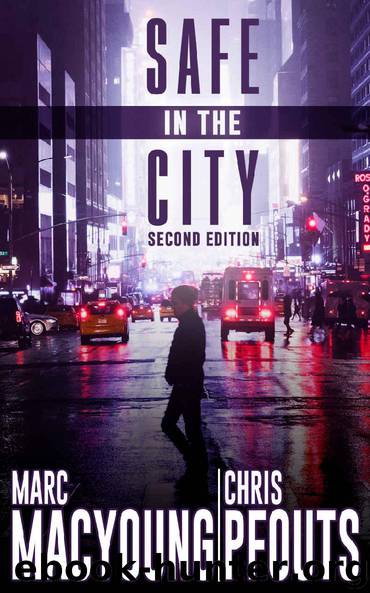Safe in the City: A streetwise guide to avoid being robbed, ripped off, or run over by Marc MacYoung & Chris Pfouts

Author:Marc MacYoung & Chris Pfouts [MacYoung, Marc]
Language: eng
Format: epub
Publisher: Carry On Publishing
Published: 2019-02-20T23:00:00+00:00
Chapter Five:
Phones—New York
Public ones don’t work. Even at Kennedy Airport, you often have to try as many as six coin phones to find a working unit. Small-time thieves and junkies jimmy the coin returns to retain the change instead of delivering it, and citizens—angry about being ripped off yet again—often disable the rest of the mechanism. Other times the units just crap out, and this is true of Bell and gypsy phones alike.
To double the jeopardy, the same brains at Bell who can’t keep the coin phones working have replaced about a third of them in Manhattan with coinless units that require you to make a calling card or collect call—which, of course, means more money for them. Future futilities will include card-operated telephones, like those in Paris and London. Card phones use debit cards, which the user buys in advance. You insert the card into the phone, and it nibbles away at your balance as you talk. What this means is that the same mental midgets who can’t keep simple coin phones operating are now going to bring advanced technology to the streets. And, this being New York and not Paris or London, the bums and wretched street refuse will jam the card slots with gum, feces, Popsicle sticks, used condoms, and whatever else they can stuff in there. It’s a failure before it begins.
If you use a calling card for long-distance calls from a pay phone, shield the numbers when you punch them in. Stealing phone card numbers is a big business in New York, and the most popular places to do it are in Grand Central Station, Penn Station, the Port Authority, and the airports. Thieves look over your shoulder or peep with scopes. Your card number will then be beeped to street corner salesmen in, say, the Bronx or Chinatown. Salesmen then sell calls at a flat rate to their customers.
Your card will be used to finance hour-long calls to Yemen, China, Zaire, Botswana, Sweden, Greenland, and other far-flung locales. People who want to call around the world pay a flat rate to the salesmen, like 10 or 15 bucks. It’s common in Chinatown at night to see lines around pay phones—customers lining up to call home and say hi to the family on a hot card number. Hot card numbers are networked around the country sometimes, so you can simultaneously have someone in Chicago calling Tibet, someone in L.A. phoning England, and somebody in New York chatting with Tierra Del Fuego—all on your bill, and all because you weren’t secretive enough with your number. Guard it like you were James Bond and it was the secret code. And, sadly, because of all the deceased coin phones, you are often forced to use a card whether you like it or not.
I think that the inability of Nynex to keep coin phones working is part of a long-range conspiracy to force everyone to buy and use cellular phones, which again means more loot for the phone company.
Download
This site does not store any files on its server. We only index and link to content provided by other sites. Please contact the content providers to delete copyright contents if any and email us, we'll remove relevant links or contents immediately.
Shoe Dog by Phil Knight(5257)
The Rules Do Not Apply by Ariel Levy(4957)
Walking by Henry David Thoreau(3953)
How to Read Water: Clues and Patterns from Puddles to the Sea (Natural Navigation) by Tristan Gooley(3461)
Running Barefoot by Amy Harmon(3445)
I'll Give You the Sun by Jandy Nelson(3428)
Crazy Is My Superpower by A.J. Mendez Brooks(3398)
How to Read Nature by Tristan Gooley(3335)
How Music Works by David Byrne(3259)
The Boy, the Mole, the Fox and the Horse by Charlie Mackesy(3114)
The Fight by Norman Mailer(2930)
Seducing Cinderella by Gina L. Maxwell(2640)
Cuba by Lonely Planet(2629)
Accepted by Pat Patterson(2364)
Going Long by Editors of Runner's World(2357)
The Unfettered Mind: Writings from a Zen Master to a Master Swordsman by Takuan Soho(2307)
Backpacker the Complete Guide to Backpacking by Backpacker Magazine(2241)
The Happy Runner by David Roche(2233)
Trail Magic by Trevelyan Quest Edwards & Hazel Edwards(2177)
